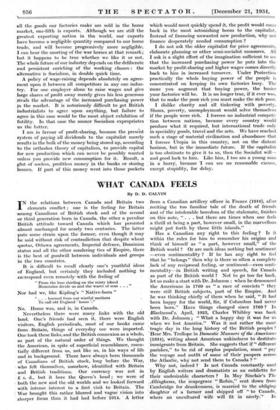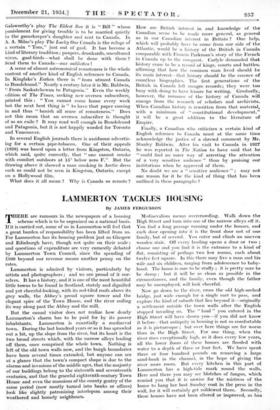WHAT CANADA FEELS
By 1). D. CALVIN
IN the relations between Canada and Britain two elements conflict ; one is the feeling for Britain -among Canadians of British stock and of the second or third generation born in Canada, the other a peculiar British attitude toward Canada which has' persisted - almost unchanged for nearly two centuries. The latter puts some strain upon the former, even though it may be said without risk of contradiction that despite wheat quotas, Ottawa agreements, Imperial defence, Dominion status and all the other sundering ties of Empire, there is the best of goodwill between individuals and groups in the two countries.
It is difficult to recall clearly one's youthful ideas of England, but certainly they included nothing to correspond even remotely. with the feeling of
" From the lone shieling on the misty island Mountains divide us and the waste of seas . . . "
Nor had we, like Bipling's " Native-born " " . . . learned from our wistful mothers To call old England home '."
No. Home was, and is, in Canada.
Nevertheless there were many links with the old land. One's friends - had seen it, there were English visitors, English periodicals, most of our books came from - Britain, things of everyday use were imported. One took these links, and the British connexion as a whole, as part of the natural order of things. We thought the American, in spite of superficial resemblance, essen- tially different from us, not like us, in his ways of life and in background. There have always been, thousands of Canadians of British stock, long before the War, who felt themselves, somehow, identified with Britain and British traditions. Our currency was not in £ s. d., but it bore the Queen's head ; we were of both the new and the old worlds and we looked forward with intense interest to a first Visit to Britain. The War brought this rather blurred and vague. vision into sharper focus than it had had before 1914. • A letter from a Canadian artillery officer in France (1916), after reciting the too familiar tale of the death of friends and of the intolerable boredom of the stalemate, finishes • on this note, " . . . but there are times when one feels a thrill at being a part, however small, in the marvellous might put forth by those little islands." .
Has a Canadian any right to this feeling ? Is it within the rules for him to remember his origins and think of himself as " a part, however small," of the British world ? Or are such ideas nothing but sentiment —even sentimentality ? If he has any right to feel that he "belongs " then why is there so often a complete lack of any reciprocal feeling, or sentiment—even senti- mentality—in British writing and speech, for Canada as part of the British world ? Not to go too far back, let us make a start with Dr. Johnson : when he denounced the Americans in 1769 as " a race of convicts " they were still British subjects, part of the Empire. And he was thinking chiefly of them when he said, " It had been happy for the world, Sir, if Columbus had never been born." Have things changed since 1769 ? In Black-wood's, April, 1925,. Charles _ Whibley was back with Dr. Johnson ; " What a happy 'lay it was for us when we lost America." Was it not rather the most ' tragic day in the long history of the British peoples ? " Hear Mrs. Trollope in Domestic Manners of the Americans (1834), writing about American unkindness to destitute immigrants from Britain. She suggests that if " different parishes," to be rid of surplus population, must " pay the voyage and outfit of some of their paupers across the Atlantic, why hot send them to Canada ? "
Why not, indeed ? Is not Canada constantly- used by English writers' and dramatists ' as an oubliette for their undesirable characters ? In May Sinclair's The Allinghams, the scapegrace " Robin," sent down from Cambridge for drunkenness, is married to the obliging daughter of 'a farmer and shipped off " to Canada, where an uncultured wife will fit in nicely." In Galsworthy's play The Eldest Son it is " Bill " whose punishment for giving trouble is to be married quietly to the gamekeeper's daughter and sent to Canada. In A. A. Milne's play The Lucky One Canada is the refuge of a certain " Torn," just out of gaol. It has become a kind of literary tradition ; paupers, drunkards, uncultured wives, gaol-birds—what shall be done with them ?
Send them to Canada—aux oubliettes! - . A sense of almost astronomical remoteness is the whole content of another kind of English reference to Canada. In Kinglake's Eothen there is " from utmost Canada to Bundelcund.". Nearly a century later it is Mr. Baldwin, From Saskatchewan to Patagonia." Even the weekly edition of The Times, seeking new oversea subscribers, printed this : " You cannot come home every week but the next best thing is " to have that paper coming in and thus " banish all sense of remoteness." Does not this mean that an oversea subscriber is thought of as an exile ? It may read well enough in Bundelcund and Patagonia, but it is not happily worded for Toronto and Vancouver.
In several English journals there is assiduous advertis- ing for a certain pipe-tobacco. One of their appeals (1928) was based upon a letter from Kingston, Ontario, which said, quite correctly, that one cannot smoke with _comfort outdoors at 15° below zero F." But the drawing above it showed a man smoking in Arctic dress such as could not be seen in Kingston, Ontario, except on a Hollywood film.
What does it all mean ? Why is Canada so remote ? How are British interest in and knowledge of the Canadian scene to be made more general, as general as in our Canadian interest in Britain ? One help, which will probably have to come from our side of the Atlantic, would be a history of the British in Canada comparable with Francis Parkman's story of the French in Canada up to the conquest. Carlyle demanded that history cease to be a record of kings, courts and battles. affirming that how the common man lived should be its main interest—that history should be the essence of countless biographies. The first generations of the British in Canada left meagre records; they were too busy with doing to have leisure for writing. Gradually, however, the romance of the history of Canada will emerge from the research of scholars and archivists. When Canadian history is rewritten from that material, with a minimum of " constitutional development," it will be a great addition to the literature of Empire.
Finally, a Canadian who criticizes a certain kind of English reference to Canada must at the same time acknowledge the justice of a shrewd comment by Mr. Stanley Baldwin. After his visit to Canada in 1927 he was reported in The Nation to have said that he " could find no surer way of arresting the attention of a very sensitive audience " than ,by praising our institutions when he approved of them.
No doubt we are a " sensitive audience " ; may not one reason for it be the kind of thing that has been outlined in these paragraphs ?



































 Previous page
Previous page